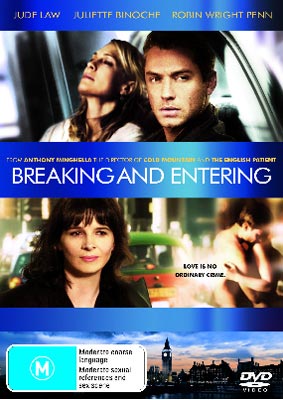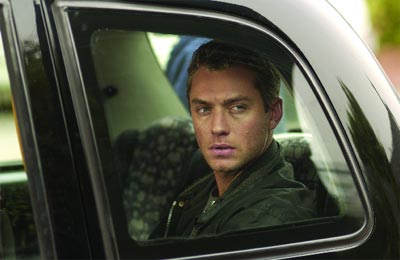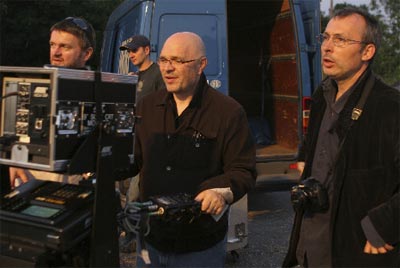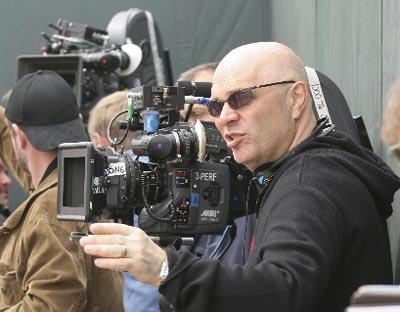Anthongy Minghella Breaking & Entering Interview

As the star-studded Breaking and Entering comes to DVD, Oscar-winning writer-director Anthony Minghella explains how a real-life break-in inspired his story of broken relationships, starring Jude Law, Martin Freeman, Juliette Binoche, Robin Wright Penn and Ray Winstone
Like many great films, Breaking and Entering is not an easy film to categorize. Set in present-day London, it stars Jude Law as an architect whose office is broken into, an event which draws him into an unexpected, passionate and forbidden affair that threatens to wreck the lives of everyone around him. Written and directed by Oscar winner Anthony Minghella, it's a far cry from the lavish period settings of his previous films, including The Talented Mr Ripley, Cold Mountain and The English Patient, for which he won the Best Director Oscar. Yet Breaking and Entering has two elements in common with those previous films. Firstly, it has an exceptional cast - in this case Law, Oscar winner Juliette Binoche, Robin Wright Penn, Martin Freeman and Ray Winstone. Secondly, it has an extraordinarily strong sense of time and place - which, here, just happens to be London in the 21st century. And finally, like Minghella's previous films, it's actually about something. But what?
Anthongy Minghella: I had an idea about fifteen years ago just after Truly Madly Deeply, about a couple who come back from a dinner party to find their house had been burgled, but instead of things being taken, they had been added, and the elements that had been added was kind of indicative of the problems in their relationship. I liked the idea very much and I couldn't find any way of articulating it beyond the first couple of scenes. And while I was shooting Cold Mountain we were moving into an office in London, which became the victim of a series of petty crimes, break-ins, and so on, and it reminded me of this idea I'd had a long time earlier and from that grew the idea of a film.
 The burglary is really just the jumping-off point, though, for a story about people desperately trying to communicate somehow. All of the characters seem to have barriers between them, be they emotional, or linguistic, or cultural.
The burglary is really just the jumping-off point, though, for a story about people desperately trying to communicate somehow. All of the characters seem to have barriers between them, be they emotional, or linguistic, or cultural.
Anthongy Minghella: Yes, and it's full of things that intrigue me, not least because I'm from an immigrant family and I'm intrigued by the issue of migration and how it works in London, and how many languages and cultures and values co-exist -- all that seemed to be such fertile ground for exploration in the film. And I was fascinated by the fact that there were so many different kinds of life experience in the same corner of London, you could meet people whose language, values, belief systems, and experiences are diametrically opposed to each other, there's absolutely no consensus whatsoever except a kind of tacit agreement except to leave people alone as much as possible. And it's bizarre, and unnatural, and curious. You get ghettos be they social, tribal, philosophical, and so onů and everybody gravitates to them and stays there. So although you can celebrate the number of languages spoken, the culture's fairly monochrome, there are just a lot of different cultures discreetly organized in the same road. And i wanted to try and look at that using the metaphor of a burglary, because that is the most common way in which two cultures collide, somebody taking something from somebody else, and having more than somebody else.
As a film maker, you've become best known for book adaptations. How did it feel to be working on your first original screenplay since Truly Madly Deeply?
Anthongy Minghella: I didn't ever intend to be an adaptor of novels, I began as a playwright and always assumed I would write my own idas, but it didn't work out that way. So after Cold Mountain I was very anxious to see what it might be like to write a story that I might see unfold out of the back window of my house, and not have this dislocation between my life and filmmaking. And I also wanted to make a film in London, a city I love, and a film that was about something. So writing it was a real pleasure. And I was shooting in London, on a much smaller scale than something like Cold Mountain, where there were often a thousand or fifteen hundred people on the set! I loved every day of shooting on the film. It was very loose, it felt very simple, in a way that I hadn't experienced for many years, that sense of a genuine independent spirit. It's very hard when you're spending 80 or 90 million dollars to change your mind too many times, or not be conscious of the weight of the budget on your shoulders, and not make a film that will return the investment of the studio. I felt much more personal in this film, the style of filming is quirkier, and would love to work on that scale again.
 Ripley, The English Patient and Cold Mountain were all period films, whereas Breaking and Entering is very much a 21st century story.
Ripley, The English Patient and Cold Mountain were all period films, whereas Breaking and Entering is very much a 21st century story.
Anthongy Minghella: Yes, and in period filmmaking you're very rarely able to look at what's in front of you, so there's a much more controlled element. Shooting present day, you're not having to rearrange the world so much. So we could walk out into London's King's Cross and shoot what was there.
Was that hard to do, given that you were working with someone as famous as Jude Law?
Anthongy Minghella: It's always hard to work with very well known actors in a public setting, but England is remarkably cool about celebrity. In fact there's a sequence we shot on Primrose Hill for which we able to shoot quite an emotional scene between Jude Law and Juliette Binoche surrounded by people picnicking, who didn't interfere or trespass into our shot, they were extremely cooperative.
Let's talk about the cast for a moment. You have Juliet Stevenson from Truly Madly Deeply, Ray Winstone from Cold Mountain, Juliette Binoche from The English Patient, and Jude Law from Ripley and Cold Mountain... It's like the 'Anthony Minghella Repertory Players'!
Anthongy Minghella: I would like to work with those actors repeatedly. Why wouldn't you want to work with Juliette Binoche in every movie? It was third time in a row with Jude, and he'd never let me down, and he'd always worked magnificently with me. And he's a friend of mine, so it's great to come to work with people you like.
Why is Jude Law so underrated as an actor?
Anthongy Minghella: I wish I knew! I remember reading some extremely pejorative piece about Alfie, a kind of rubbishing of his acting based on the fact that he's so handsome. Because I know him and don't think of him as anything other than an actor, I'm not quite caught up in how exquisite he is to look at, it seems very perverse to me that should be a way to adjudicate somebody's work. But the great thing about Jude is that he's got a great career ahead of him, and I think as his looks becomes less significant part of the package, our interest in him as an actor will rise rather than fall. Certainly Johnny Depp has come into his own now that's got to a place where he's a handsome guy rather than a creature of extraordinary beauty.
 Given that Breaking and Entering is partly about the clash of cultures and languages, it's ironic that the film feels like something Pedro Almodovar or Krzysztof Kieslowski could have made.
Given that Breaking and Entering is partly about the clash of cultures and languages, it's ironic that the film feels like something Pedro Almodovar or Krzysztof Kieslowski could have made.
Anthongy Minghella: You're not the first person to say that. And also, when I was thinking about making the film, I kept thinking about Kieslowski, and I admired his work so much, inevitably I ended up looking at the film as if it were a Kieslowski film because it doesn't tell its story linearly, and it's not necessarily biased towards one character -- it tries to forgive everybody. In the English and American cinema it's very hard to have central characters who have moral shortcomings, whereas some of the European cinema you're not looking for morally scrupulous protagonists, you're enjoying their frailty. It's a film that I'm enormously proud to have made, I love Jude's work in the film, all the actors' work, and it's always frustrating when it doesn't connect.
Well now that the DVD is coming out, I think the film will really come into its own, as people start to discover it, and realize what an extraordinary piece of work it is.
Anthongy Minghella: I hope so. In the last couple of months I've been getting an enormous amount of correspondence from people who've caught the film and been sympathetic to it, and it's made me feel that perhaps it's a movie that will take a little time to find the people who feel the same way about the issues of the film as I do.
Order Now from Chaos
Order Now from Sanity
Like many great films, Breaking and Entering is not an easy film to categorize. Set in present-day London, it stars Jude Law as an architect whose office is broken into, an event which draws him into an unexpected, passionate and forbidden affair that threatens to wreck the lives of everyone around him. Written and directed by Oscar winner Anthony Minghella, it's a far cry from the lavish period settings of his previous films, including The Talented Mr Ripley, Cold Mountain and The English Patient, for which he won the Best Director Oscar. Yet Breaking and Entering has two elements in common with those previous films. Firstly, it has an exceptional cast - in this case Law, Oscar winner Juliette Binoche, Robin Wright Penn, Martin Freeman and Ray Winstone. Secondly, it has an extraordinarily strong sense of time and place - which, here, just happens to be London in the 21st century. And finally, like Minghella's previous films, it's actually about something. But what?
Anthongy Minghella: I had an idea about fifteen years ago just after Truly Madly Deeply, about a couple who come back from a dinner party to find their house had been burgled, but instead of things being taken, they had been added, and the elements that had been added was kind of indicative of the problems in their relationship. I liked the idea very much and I couldn't find any way of articulating it beyond the first couple of scenes. And while I was shooting Cold Mountain we were moving into an office in London, which became the victim of a series of petty crimes, break-ins, and so on, and it reminded me of this idea I'd had a long time earlier and from that grew the idea of a film.
 The burglary is really just the jumping-off point, though, for a story about people desperately trying to communicate somehow. All of the characters seem to have barriers between them, be they emotional, or linguistic, or cultural.
The burglary is really just the jumping-off point, though, for a story about people desperately trying to communicate somehow. All of the characters seem to have barriers between them, be they emotional, or linguistic, or cultural.Anthongy Minghella: Yes, and it's full of things that intrigue me, not least because I'm from an immigrant family and I'm intrigued by the issue of migration and how it works in London, and how many languages and cultures and values co-exist -- all that seemed to be such fertile ground for exploration in the film. And I was fascinated by the fact that there were so many different kinds of life experience in the same corner of London, you could meet people whose language, values, belief systems, and experiences are diametrically opposed to each other, there's absolutely no consensus whatsoever except a kind of tacit agreement except to leave people alone as much as possible. And it's bizarre, and unnatural, and curious. You get ghettos be they social, tribal, philosophical, and so onů and everybody gravitates to them and stays there. So although you can celebrate the number of languages spoken, the culture's fairly monochrome, there are just a lot of different cultures discreetly organized in the same road. And i wanted to try and look at that using the metaphor of a burglary, because that is the most common way in which two cultures collide, somebody taking something from somebody else, and having more than somebody else.
As a film maker, you've become best known for book adaptations. How did it feel to be working on your first original screenplay since Truly Madly Deeply?
Anthongy Minghella: I didn't ever intend to be an adaptor of novels, I began as a playwright and always assumed I would write my own idas, but it didn't work out that way. So after Cold Mountain I was very anxious to see what it might be like to write a story that I might see unfold out of the back window of my house, and not have this dislocation between my life and filmmaking. And I also wanted to make a film in London, a city I love, and a film that was about something. So writing it was a real pleasure. And I was shooting in London, on a much smaller scale than something like Cold Mountain, where there were often a thousand or fifteen hundred people on the set! I loved every day of shooting on the film. It was very loose, it felt very simple, in a way that I hadn't experienced for many years, that sense of a genuine independent spirit. It's very hard when you're spending 80 or 90 million dollars to change your mind too many times, or not be conscious of the weight of the budget on your shoulders, and not make a film that will return the investment of the studio. I felt much more personal in this film, the style of filming is quirkier, and would love to work on that scale again.
 Ripley, The English Patient and Cold Mountain were all period films, whereas Breaking and Entering is very much a 21st century story.
Ripley, The English Patient and Cold Mountain were all period films, whereas Breaking and Entering is very much a 21st century story.Anthongy Minghella: Yes, and in period filmmaking you're very rarely able to look at what's in front of you, so there's a much more controlled element. Shooting present day, you're not having to rearrange the world so much. So we could walk out into London's King's Cross and shoot what was there.
Was that hard to do, given that you were working with someone as famous as Jude Law?
Anthongy Minghella: It's always hard to work with very well known actors in a public setting, but England is remarkably cool about celebrity. In fact there's a sequence we shot on Primrose Hill for which we able to shoot quite an emotional scene between Jude Law and Juliette Binoche surrounded by people picnicking, who didn't interfere or trespass into our shot, they were extremely cooperative.
Let's talk about the cast for a moment. You have Juliet Stevenson from Truly Madly Deeply, Ray Winstone from Cold Mountain, Juliette Binoche from The English Patient, and Jude Law from Ripley and Cold Mountain... It's like the 'Anthony Minghella Repertory Players'!
Anthongy Minghella: I would like to work with those actors repeatedly. Why wouldn't you want to work with Juliette Binoche in every movie? It was third time in a row with Jude, and he'd never let me down, and he'd always worked magnificently with me. And he's a friend of mine, so it's great to come to work with people you like.
Why is Jude Law so underrated as an actor?
Anthongy Minghella: I wish I knew! I remember reading some extremely pejorative piece about Alfie, a kind of rubbishing of his acting based on the fact that he's so handsome. Because I know him and don't think of him as anything other than an actor, I'm not quite caught up in how exquisite he is to look at, it seems very perverse to me that should be a way to adjudicate somebody's work. But the great thing about Jude is that he's got a great career ahead of him, and I think as his looks becomes less significant part of the package, our interest in him as an actor will rise rather than fall. Certainly Johnny Depp has come into his own now that's got to a place where he's a handsome guy rather than a creature of extraordinary beauty.
 Given that Breaking and Entering is partly about the clash of cultures and languages, it's ironic that the film feels like something Pedro Almodovar or Krzysztof Kieslowski could have made.
Given that Breaking and Entering is partly about the clash of cultures and languages, it's ironic that the film feels like something Pedro Almodovar or Krzysztof Kieslowski could have made.Anthongy Minghella: You're not the first person to say that. And also, when I was thinking about making the film, I kept thinking about Kieslowski, and I admired his work so much, inevitably I ended up looking at the film as if it were a Kieslowski film because it doesn't tell its story linearly, and it's not necessarily biased towards one character -- it tries to forgive everybody. In the English and American cinema it's very hard to have central characters who have moral shortcomings, whereas some of the European cinema you're not looking for morally scrupulous protagonists, you're enjoying their frailty. It's a film that I'm enormously proud to have made, I love Jude's work in the film, all the actors' work, and it's always frustrating when it doesn't connect.
Well now that the DVD is coming out, I think the film will really come into its own, as people start to discover it, and realize what an extraordinary piece of work it is.
Anthongy Minghella: I hope so. In the last couple of months I've been getting an enormous amount of correspondence from people who've caught the film and been sympathetic to it, and it's made me feel that perhaps it's a movie that will take a little time to find the people who feel the same way about the issues of the film as I do.
Order Now from Chaos
Order Now from Sanity
MORE
- Viggo Mortensen The Road
- 24 Cast Reunion
- Aaron Eckhardt No Reservations
- Aaron Eckhart The Dark Knight
- Adam McKay Step Brothers Interview
- Alan Alda Diminished Capacity Interview
- Alan Alda Diminished Capacity Interview
- Alex Dimitriades
- Al Pacino Oceans 13
- Alan Rickman Snow Cake
- Alan Rickman Sweeney Todd



